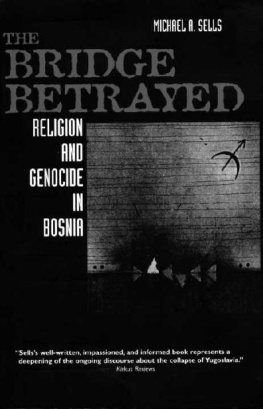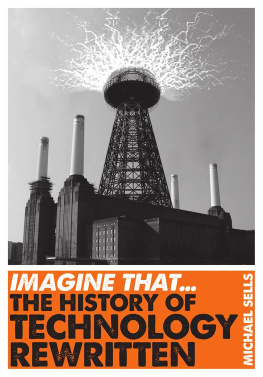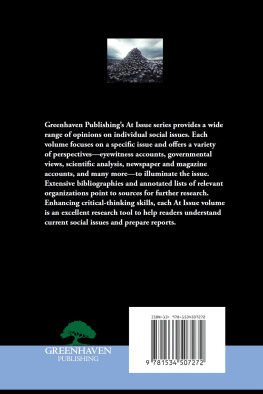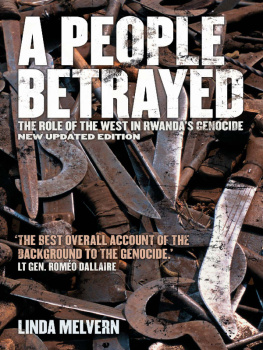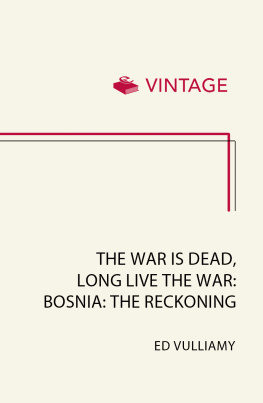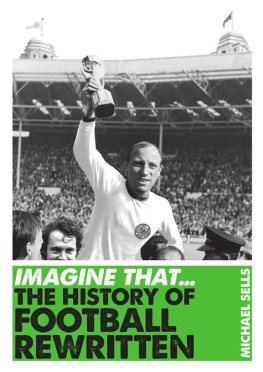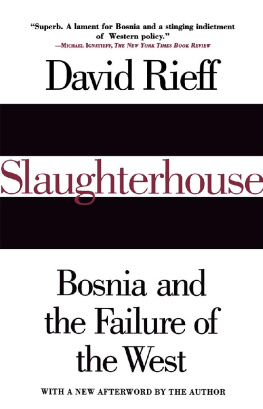Michael A. Sells - The Bridge Betrayed: Religion and Genocide in Bosnia
Here you can read online Michael A. Sells - The Bridge Betrayed: Religion and Genocide in Bosnia full text of the book (entire story) in english for free. Download pdf and epub, get meaning, cover and reviews about this ebook. year: 1996, publisher: University of California Press, genre: Politics. Description of the work, (preface) as well as reviews are available. Best literature library LitArk.com created for fans of good reading and offers a wide selection of genres:
Romance novel
Science fiction
Adventure
Detective
Science
History
Home and family
Prose
Art
Politics
Computer
Non-fiction
Religion
Business
Children
Humor
Choose a favorite category and find really read worthwhile books. Enjoy immersion in the world of imagination, feel the emotions of the characters or learn something new for yourself, make an fascinating discovery.
- Book:The Bridge Betrayed: Religion and Genocide in Bosnia
- Author:
- Publisher:University of California Press
- Genre:
- Year:1996
- Rating:4 / 5
- Favourites:Add to favourites
- Your mark:
- 80
- 1
- 2
- 3
- 4
- 5
The Bridge Betrayed: Religion and Genocide in Bosnia: summary, description and annotation
We offer to read an annotation, description, summary or preface (depends on what the author of the book "The Bridge Betrayed: Religion and Genocide in Bosnia" wrote himself). If you haven't found the necessary information about the book — write in the comments, we will try to find it.
The Bridge Betrayed: Religion and Genocide in Bosnia — read online for free the complete book (whole text) full work
Below is the text of the book, divided by pages. System saving the place of the last page read, allows you to conveniently read the book "The Bridge Betrayed: Religion and Genocide in Bosnia" online for free, without having to search again every time where you left off. Put a bookmark, and you can go to the page where you finished reading at any time.
Font size:
Interval:
Bookmark:

MARK JUERGENSMEYER, editor
i. Redemptive Encounters: Three Modern Styles in the Hindu Tradition, by Lawrence Babb
2. Saints and Virtues, edited by John Stratton Hawley
3. Utopias in Conflict: Religion and Nationalism in Modern India, by Ainslee T. Embree
4. Mama Lola: A Vodou Priestess in Brooklyn, by Karen McCarthy Brown
5. The New Cold War? Religious Nationalism Confronts the Secular State, by Mark Juergensmeyer
6. Pious Passion: The Emergence of Modern Fundamentalism in the United States and Iran, by Martin Riesebrodt, translated by Don Reneau
7. Devi: Goddesses of India, edited by John Stratton Hawley and Donna Marie Wulff
8. Absent Lord: Ascetics and Kings in a lain Ritual Culture, by Lawrence A. Babb
9. The Challenge of Fundamentalism: Political Islam in the New World Disorder, by Bassani Tibi
io. Levelling Crowds: Ethno-nationalist Conflicts and Collective Violence in South Asia, by Stanley J. Tambiah
i i. The Bridge Betrayed: Religion and Genocide in Bosnia, by Michael A. Sells
12. China's Catholics: Tragedy and Hope in an Emerging Civil Society, by Richard Madsen
13. Terror in the Mind of God: The Global Rise of Religious Violence, by Mark Juergensmeyer
Michael A. Sells
With a New Preface

This book is dedicated to the tens of thousands of Bosnian civilians who are now missing; and to the effort to find them if they are alive, to account for their fate if they are not, to bring to justice those who harmed them; and to the possibility of a genuine peace.
In memory of my mother, Simona Sally Trbovich (1926-1961).
ix
xiii
xxi
j = English "y"
The names Lejla and Jasmina are pronounced LAY-la and yas-MEEN-a.
c = English "ch"
Jovic, a last name, is pronounced YO-vich. Some Slavs in the West add an "h" to make the pronunciation clear, while others keep the original spelling.
Mihajlovic (Michaelson) is pronounced Mi-HAY-lo-vich.
c = a slightly different form of English "ch"
The town of Foca is pronounced FO-cha.
s = English "sh"
Pasic and Basic (common last names derived from the Ottoman honorific title "Pasha") are pronounced PAH-shich and BAH-shich. Musanovic (Moses-son) is pronounced Mu- SHA-no-vich.
z = French "j" or "z" as in "azure"
The southeast Bosnian town of Zepa is pronounced ZHEH-pa.
k = English "k"
c = English "tz"
Stolac, a town in Herzegovina, is pronounced STO-latz.

PAPERBACK EDITION
Whoever is a Serb of Serbian blood Whoever shares with me this heritage, And he comes not to fight at Kosovo, May he never have the progeny His heart desires, neither son nor daughter; Beneath his hand let nothing decent grow Neither purple grapes nor wholesome wheat; Let him rust away like dripping iron Until his name be extinguished.'
The Balkan tragedy began in the Serbian province of Kosovo as the mythology embodied in this famous "curse of Kosovo" was, in the words of one Serbian nationalist, "resurrected" on Lazar's day (Vidovdan), June 28, 1989, which commemorated the 6ooth anniversary of the death of the Serb prince Lazar at the battle of Kosovo in 1389. Religious nationalists manipulated the vision of Lazar as a Christ figure to portray all Yugoslav Muslims, not just the Ottoman Turks who fought Lazar, as responsible for the death of the Christ-prince Lazar at the "Serbian Golgotha." Serbian President Slobodan Milosevic stood before the crowd of more than a million people and used the battle of Kosovo to threaten a new crusade against the Islam and other enemies, both in Kosovo province and throughout Yugoslavia. The passion play brought about a classic collapse of time in which the audience felt themselves to be participants in the primordial passion and death of the Christ-prince. In Bosnia they acted as if they were living in 1389 and carrying out revenge against the Christ-killers. The same violence now threatens to explode at the epicenter of the conflict-Kosovo.
In Sarajevo the guns are silent. Bosnia rebuilds. Forensic teams excavate mass graves near the concentration camps and killing centers. NATO forces have arrested some indicted war criminals. In a moment of hope and pathos, the stones of the Old Bridge at Mostar have been retrieved from the bottom of the Neretva River under a plan to rebuild the bridge and the old city.
Yet those war criminals still at large continue to resist the key element of the Dayton Accords: the return of refugees to their homes. The two men most responsible for the destruction of Yugoslavia, Serbia's Milosevic and Croatia's Franjo Tudjman, remain in power. Croat religious nationalists and gangsters control West Mostar and its surroundings. Survivors of the Srebrenica massacre desperately seek information on loved ones last seen being selected in front of UN troops and led away for extermination. And in Kosovo, Serb nationalist forces are testing the same tactics of "ethnic cleansing" they used with impunity in Bosnia.
Newly publicized statements of Bosnian Serb President Biljana Plavsic demonstrate the relationship between Kosovo religious mythology, extreme nationalism, and racialist theory that this book explores. At the height of the "ethnic cleansing" against Bosnian Muslims, Plavsic announced that "it was genet ically deformed material that embraced Islam. And now, of course, with each successive generation this gene simply becomes concentrated. It gets worse and worse. It simply expresses itself and dictates their style of thinking and behaving, which is rooted in their genes."'
Plavsic, former dean of the Faculty of Natural Science and Mathematics in Sarajevo, transformed herself from a secularist and a professional biologist into an ethnoreligious theorist of religious conversion as genetic deformation. Her sudden conversion exemplifies the power and function of the Kosovo-based ideology of Christoslavism examined in this book. Christoslavism maintains that Slavs are Christian by nature, that conversion to another religion entails or presupposes a transformation or deformation of the Slavic race, and that all Muslims in Yugoslavia (whether ethnic Slavs or Albanians) have transformed themselves into Turks and are personally responsible for the death of the Christ-prince Lazar at the Serbian Golgotha (the battle of Kosovo) and for the pollution of the Slavic race. At moments of crisis, the Kosovo ideology helps efface the boundaries between notions of religion and race and turns religious nationalism into the most virulent form of racialist ideology. It must be emphasized that the power of this racio-religious mythology is unaffected by the personal piety or lack of personal piety of those who accept it or exploit it. As the cases of Plavsic and many of her former secularist and communist colleagues show, the abuse of religious symbolism is not dependent upon self-conscious beliefs or personal sincerity; rather it operates on the levels of the subconscious and mass psychology.
Font size:
Interval:
Bookmark:
Similar books «The Bridge Betrayed: Religion and Genocide in Bosnia»
Look at similar books to The Bridge Betrayed: Religion and Genocide in Bosnia. We have selected literature similar in name and meaning in the hope of providing readers with more options to find new, interesting, not yet read works.
Discussion, reviews of the book The Bridge Betrayed: Religion and Genocide in Bosnia and just readers' own opinions. Leave your comments, write what you think about the work, its meaning or the main characters. Specify what exactly you liked and what you didn't like, and why you think so.

